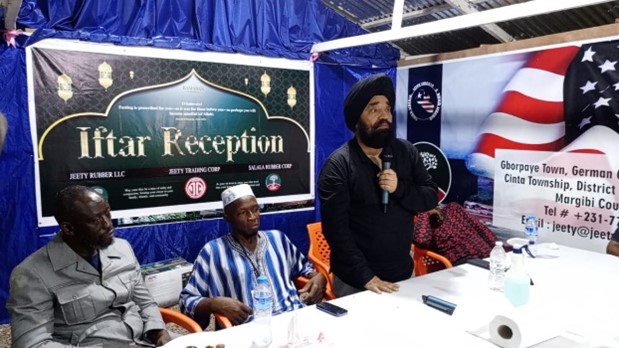In the heart of Margibi County, Liberia, amidst the sprawling rubber plantations of Weala, a remarkable display of interfaith harmony and corporate social responsibility unfolded during the holy month of Ramadan in March 2025. Jeety Rubber LLC and its sister company, Salala Rubber Corporation (SRC), orchestrated a grand Iftar dinner, a tradition of breaking the daily fast, to honor their Muslim employees and the broader Islamic community. This gesture transcended the typical employer-employee relationship, fostering a sense of unity and mutual respect that resonated deeply within the community.
The Iftar dinner, held on the grounds of the Jeety Rubber factory, transformed the industrial setting into a vibrant hub of cultural exchange and spiritual reflection. Scores of attendees, including employees, local leaders, and community members, gathered in a spirit of togetherness. The air was filled with the warmth of camaraderie and the aroma of traditional Liberian and Middle Eastern dishes, a culinary fusion that symbolized the bridging of cultures and the shared humanity that binds people together. The event served as a testament to the power of inclusivity and the importance of acknowledging the diverse faiths and traditions that enrich a society.
At the helm of this initiative was Upjit Singh Sachdeva, the CEO of both Jeety Rubber and SRC, a prominent Indian businessman known for his philanthropic endeavors and commitment to community development. Sachdeva, in his address to the gathering, emphasized the significance of Ramadan as a period of reflection, compassion, and gratitude. He underscored the companies’ dedication to honoring their Muslim employees, recognizing their invaluable contributions to the organizations’ success and the wider community’s well-being. He reiterated that the Iftar dinner was a small token of appreciation, reflecting the companies’ core values of respecting and valuing every individual irrespective of their tribe, religion, or race. This commitment, he assured, extended beyond symbolic gestures during religious occasions and formed the bedrock of their operational ethos throughout the year.
The impact of this gesture was profound, particularly on the Muslim employees, who expressed their heartfelt gratitude for the recognition and respect shown towards their faith. For many, this was an unprecedented experience, a testament to the growing understanding and acceptance of Islam within the corporate landscape. The Iftar dinner, they affirmed, was more than just a meal; it symbolized a bridge between different faiths and communities, fostering a sense of belonging and shared purpose. This sentiment echoed through the gathering, reinforcing the message that inclusivity and respect are not mere buzzwords but tangible actions that create a positive and productive work environment.
The employees’ reactions underscored the significance of Sachdeva’s initiative. Many expressed that the Iftar dinner made them feel valued and appreciated, not just as employees but as individuals with unique cultural and religious identities. This sentiment was particularly poignant for some long-term employees who had never witnessed such a demonstrable act of recognition for their faith during Ramadan. This gesture, they acknowledged, transcended the traditional employer-employee dynamic, fostering a sense of family and belonging within the workplace. It was a clear indication that their contributions were valued, and their faith was respected, creating a more inclusive and harmonious work environment.
The Iftar dinner concluded with a reaffirmation from company executives of their commitment to employee welfare, cultural diversity, and community engagement. This commitment extended beyond symbolic gestures, demonstrating a genuine desire to foster a workplace where every individual feels valued and respected. The event served as a powerful example of how businesses can play a vital role in promoting interfaith harmony and strengthening community bonds. It underscored the importance of recognizing and celebrating the diverse cultural and religious backgrounds of employees, creating a more inclusive and harmonious workplace that benefits both the individuals and the organization as a whole. The ripple effect of this single act of kindness and understanding extended far beyond the factory walls, setting a precedent for other businesses and organizations to follow in fostering a culture of respect and inclusivity.


